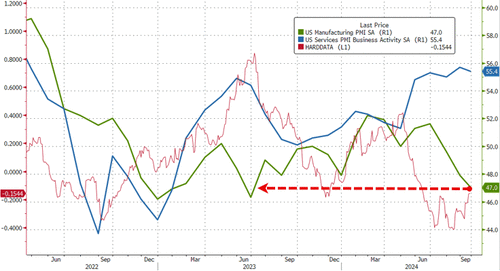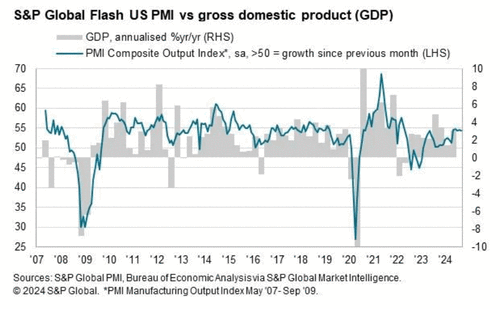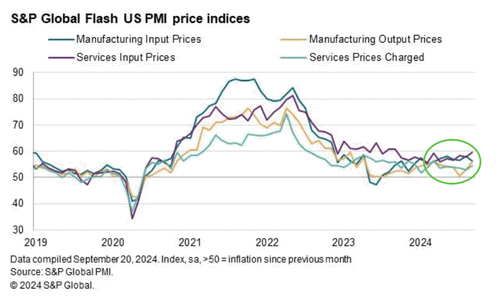
Following the shitshow that was European PMIs overnight, preliminary September soft survey data for the US was expected to be mixed with Services weaker but Manufacturing bouncing back a little.
Despite strength in 'hard' data relative to expectations, PMIs disappointed in the early September print with both Services and Manufacturing falling.
-
S&P Global US Manufacturing PMI 47.0 (48.6 exp, 47.9 prior) - lowest since June 2023
-
S&P Global US Services PMI 55.4 (55.2 exp, 55.7 prior) - two-month lows
Source: Bloomberg
Commenting on the data, Chris Williamson, Chief Business Economist at S&P Global Market Intelligence said:
“The early survey indicators for September point to an economy that continues to grow at a solid pace, albeit with a weakened manufacturing sector and intensifying political uncertainty acting as substantial headwinds. A reacceleration of inflation is meanwhile also signalled, suggesting the Fed cannot totally shift its focus away from its inflation target as it seeks to sustain the economic upturn.
“The sustained robust expansion of output signaled by the PMI in September is consistent with a healthy annualized rate of GDP growth of 2.2% in the third quarter. But there are some warning lights flashing, notably in terms of the dependence on the service sector for growth, as manufacturing remained in decline, and the worrying drop in business confidence.
Under the hood, things are more worrisome:
“Business sentiment, demand, hiring and investment are being subdued by uncertainty surrounding the Presidential Election, casting a shadow over the outlook for the year ahead at many firms.
“The survey’s price gauges meanwhile serve as a warning that, despite the PMI indicating a further deterioration of the hiring trend in September, the FOMC may need to move cautiously in implementing further rate cuts. Prices charged for goods and services are both rising at the fastest rates for six months, with input costs in the services sector – a major component of which is wages and salaries – rising at the fastest rate for a year.”
Stagflation Anyone... Not exactly what a 50-bps-rate-cutting Fed wants to see!!!
Following the shitshow that was European PMIs overnight, preliminary September soft survey data for the US was expected to be mixed with Services weaker but Manufacturing bouncing back a little.
Despite strength in ‘hard’ data relative to expectations, PMIs disappointed in the early September print with both Services and Manufacturing falling.
-
S&P Global US Manufacturing PMI 47.0 (48.6 exp, 47.9 prior) – lowest since June 2023
-
S&P Global US Services PMI 55.4 (55.2 exp, 55.7 prior) – two-month lows
Source: Bloomberg
Commenting on the data, Chris Williamson, Chief Business Economist at S&P Global Market Intelligence said:
“The early survey indicators for September point to an economy that continues to grow at a solid pace, albeit with a weakened manufacturing sector and intensifying political uncertainty acting as substantial headwinds. A reacceleration of inflation is meanwhile also signalled, suggesting the Fed cannot totally shift its focus away from its inflation target as it seeks to sustain the economic upturn.
“The sustained robust expansion of output signaled by the PMI in September is consistent with a healthy annualized rate of GDP growth of 2.2% in the third quarter. But there are some warning lights flashing, notably in terms of the dependence on the service sector for growth, as manufacturing remained in decline, and the worrying drop in business confidence.
Under the hood, things are more worrisome:
“Business sentiment, demand, hiring and investment are being subdued by uncertainty surrounding the Presidential Election, casting a shadow over the outlook for the year ahead at many firms.
“The survey’s price gauges meanwhile serve as a warning that, despite the PMI indicating a further deterioration of the hiring trend in September, the FOMC may need to move cautiously in implementing further rate cuts. Prices charged for goods and services are both rising at the fastest rates for six months, with input costs in the services sector – a major component of which is wages and salaries – rising at the fastest rate for a year.”
Stagflation Anyone… Not exactly what a 50-bps-rate-cutting Fed wants to see!!!
Loading…







